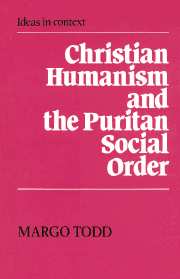Book contents
- Frontmatter
- Contents
- preface
- Abbreviations
- 1 Introduction: The demythologizing of puritanism
- 2 Christian humanism as social ideology
- 3 The transmission of Christian humanist ideas
- 4 The spiritualized household
- 5 Work, wealth and welfare
- 6 Conscience and the Great Chain of Being
- 7 The conservative reaction: Trent, Lambeth and the demise of the humanist consensus
- Bibliography
- Index
5 - Work, wealth and welfare
Published online by Cambridge University Press: 06 July 2010
- Frontmatter
- Contents
- preface
- Abbreviations
- 1 Introduction: The demythologizing of puritanism
- 2 Christian humanism as social ideology
- 3 The transmission of Christian humanist ideas
- 4 The spiritualized household
- 5 Work, wealth and welfare
- 6 Conscience and the Great Chain of Being
- 7 The conservative reaction: Trent, Lambeth and the demise of the humanist consensus
- Bibliography
- Index
Summary
The assumption that puritan concern with discipline led to a stereotypically bourgeois disdain for the idle as social parasites and the poor as justly condemned of God has become an historiographical commonplace. The material prosperity which in at least some cases accompanied the puritans’ single-minded devotion to labor in a calling has brought against them charges of greed, uncharitable attitudes and exploitative business practices, from both contemporary opponents and modern historians. Richard Bancroft accused puritan preachers of complacent unconcern with gentry oppression of the poor and failure to exhort their congregations to charity. And in a 1636 sermon preached in Great St Mary's, Cambridge, John Normanton of Caius charged that the love of money would ‘make the puritan leave ruling of the rest amongst his sisters and singing of preserve us, lord, from Turk and pope, and turn bishop and put on a rochet. This is that which makes the rich city cormorant, he that pays the poor water man by the statute of Harry the eighth … to devour the widow and the orphan.’
The assertions of the enemy ought to be viewed with some suspicion; nevertheless, historians since Weber and Tawney have followed the lead of the anti-puritans and attributed to the hotter sort the doctrines that wealth is a sign of God's favor and poverty an indication of divine disapproval. They have concluded that puritans were indeed proponents of a ruthlessly capitalist ethic. Louis B. Wright traced the growth of bourgeois culture in England in part to the ‘gospel of work as outlined by Perkins… [which] became a fundamental dogma in the religion of the Puritan middle class of the seventeenth century.’
- Type
- Chapter
- Information
- Christian Humanism and the Puritan Social Order , pp. 118 - 175Publisher: Cambridge University PressPrint publication year: 1988

